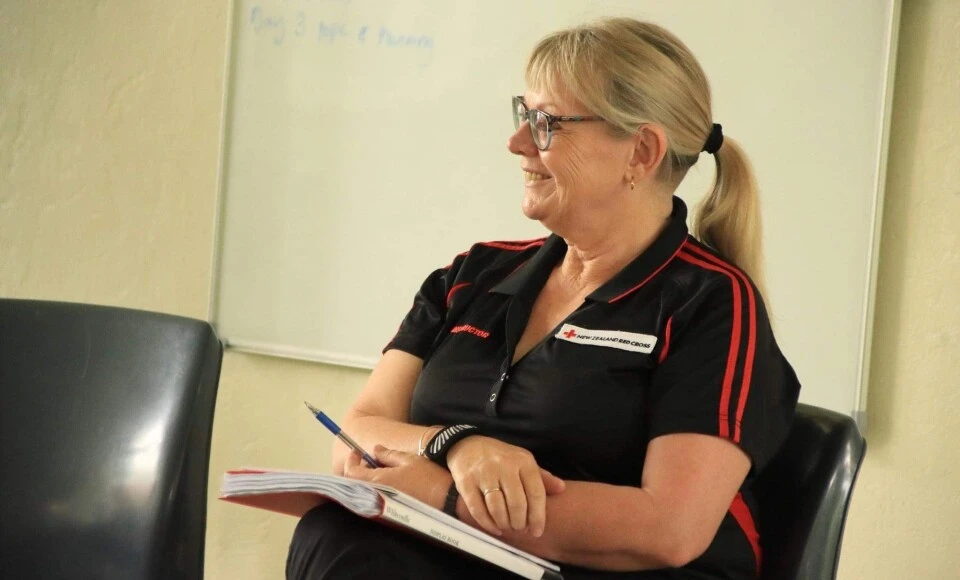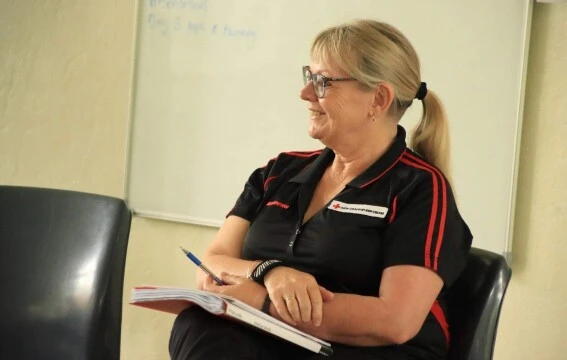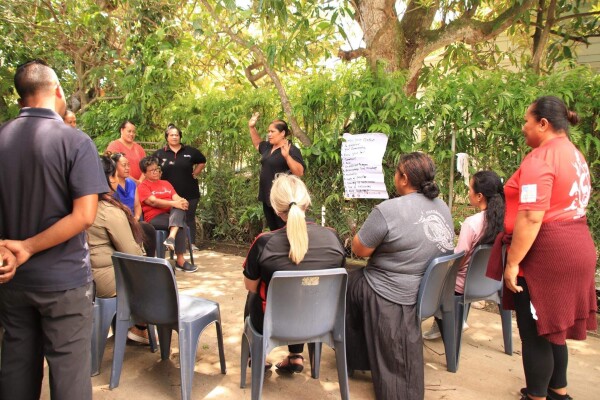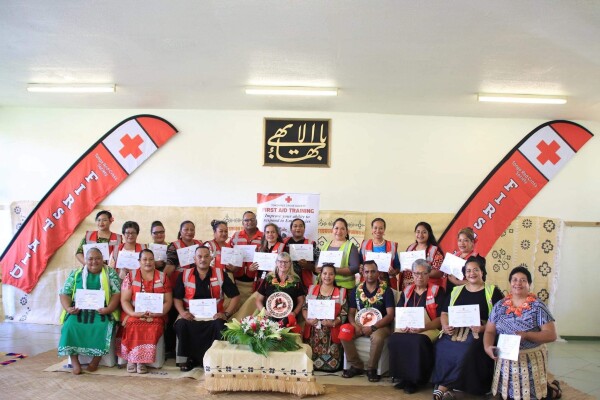Helping remote Tongan communities learn life saving first aid
9 November 2022


Tongan communities know first-hand what it’s like to live through a terrifying event, unable to access medical facilities. Now, as they recover from the Hunga Tonga-Hunga Ha’apai volcano eruption and subsequent tsunami, a group of people are learning vital first aid skills to take back to their communities across the archipelago to help them be more prepared for future emergencies.
New Zealand Red Cross international delegate Lesley Jacobson has just returned to Aotearoa New Zealand after spending two weeks teaching community first aid to 16 local first aid trainers from four different islands.
‘Community first aid training’ is all about finding out what has happened recently in the community. This might include a child choking, a drowning incident or cooking burns. These examples are then used to provide bite sized chunks of critical first aid information to course participants. They in turn, take back this knowledge to their own communities and teach people in a similar way.

Outdoor first aid presentation.
Lesley says community first aid is also about identifying what threats might be common in the country and focusing on techniques to reduce them. For example, in Tonga, participants focused on keeping wounds clean. Tonga is a hot and humid country, and people have less access to pharmaceutical anti-bacterial products, so wounds can become infected easily.
Another advantage to community first aid is that it is much more effective for people in the community to learn about first aid from people they know and trust - especially when the training covers practices that need to change.
“We had conversations with first aid trainers about how to respectfully approach people in the community who might be using inappropriate medical practices. For example, it can be common to bring blankets for someone who has a fever, but this can cause overheating, whereas placing a cooling cloth on the forehead helps to regulate the body temperature.”
Ash and pumice from the January eruption and subsequent tsunami still lie in the streets and in the gutters of Nuku’alofa, the capital. Recovery efforts are focusing on preparing communities for future emergency events, as well as rebuilding infrastructure and homes. Nancy Fisi’ilose from Pangai Ha’apai, a Tongan Red Cross volunteer, was one of the course participants. She says “the importance of the first aid training for Ha’apai and the remote islands is that help isn’t always available, so they need first aid to look after people.”

First aid course graduates.
Tonga is made up of 170 islands, 36 of which are inhabited. Many do not have access to a trained medical professional, so when an emergency occurs communities can be cut off from medical facilities and support. That’s why basic first aid knowledge is so important for all communities.
“I am lucky to be here to train more and to go back to my island to train more people so they know what to do (in a first aid situation)” says Nancy Fisi’ilose.
Lesley visited the west of Tongatapu which had significant damage from the Tsunami with three resorts wiped out.
“In New Zealand, we know to run up the nearest hill if there is a threat of a Tsunami, but here the island is flat. People had to run a kilometre inland to get away from the wave. And it’s just open ocean – there’s no reef. The tide came in from both sides. There is nothing left of the resorts, the force of the tsunami lifted the road which was at least a metre thick of solid material. The swirling force of the water wrapped roofing iron around coconut trees.”
“They are only just starting to recover from effects of the volcano and tsunami, and from COVID.
Although Lesley speaks of resilience, she also highlights the long-lasting impact that the events have had on communities and mental wellbeing. People’s stories bring home the psychological impacts of the event.
For Lesley Jacobson, she sees the strength of the people of Tonga. There is a real spirit among people to get on and rebuild their lives, and I think that has contributed to the willingness to participate in the course. “Everyone has been incredibly motivated to gain skills to take back to their communities.”
Lesley is also working with the International Federation of Red Cross and Red Crescent Societies (IFRC) and assisting the Tonga Red Cross to provide the training to the new First Aid instructors to give them the skills to take back to their communities.
Find out more
- We help communities in the Pacific prepare for disasters, provide support during an emergency event, and help communities get back on their feet afterwards.
Our work in the Pacific - Delegates provide support in several ways including helping to build capacity to strengthen disaster resilience and providing personnel and resourcing during and following a disaster.
Our international delegate programme - We deliver a wide range of first aid courses run at venues across Aotearoa, New Zealand.
Information about our first aid courses
